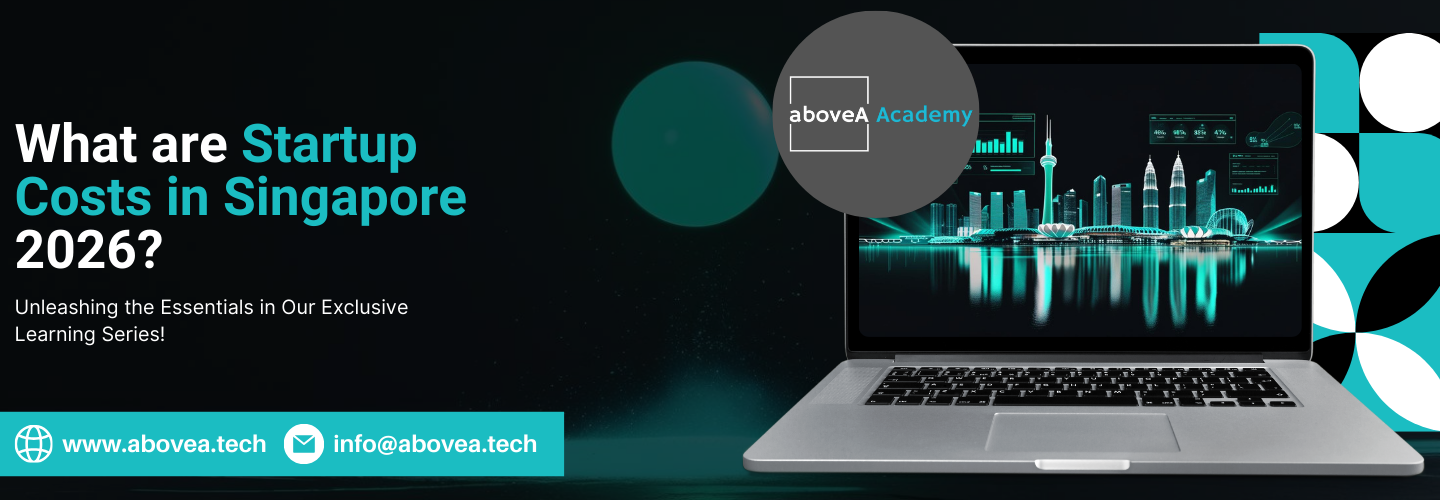

Austeja Norvaisaite
Growth hacker and strategic partnership coordinator. Passionate about blending creativity with data-driven insights to craft accessible, resonant content for diverse audiences.
How Much Does It Cost to Build a Startup in Singapore in 2026?
- Last Time Updated: 3rd of February, 2026
How much does it cost to build a startup in Singapore in 2026? Founders entering the market need clear answers before they commit. From business registration and office space to hiring employees, marketing budgets, and technology costs, every decision impacts overall expenses.
This Singaporean guide breaks down the real numbers, key trends, and support programs available for founders there. You’ll also see comparisons with other APAC hubs, examples of startup cost breakdowns, and how agencies like aboveA help reduce risks. By the end, you’ll know what to expect when budgeting for success in Singapore this year.
Scale Your Startup Smarter in Singapore’s Ecosystem
Table of Contents
Startup Registration Costs in Singapore (2026)
Startup registration costs in Singapore in 2026 are one of the first things founders check when building a company. The process is managed by the Accounting and Corporate Regulatory Authority (ACRA). Registering a private limited company typically costs SGD 300 to SGD 600, depending on the services used.
Founders also need to consider corporate secretary fees, nominee director fees, and legal compliance costs. Many startups budget an additional SGD 800 to SGD 1,200 yearly to stay compliant. While these are relatively low compared to Hong Kong or Tokyo, they are mandatory for operating.
For foreign founders, the EntrePass visa application fee is another cost. In 2026, fees are around SGD 105 for the application and SGD 225 for the issuance. Renewal fees add extra overhead, especially for early-stage startups with limited capital.
Why does this matter? A smooth registration gives startups credibility with investors, banks, and clients. Clear legal standing also helps when applying for Singapore government startup grants in 2026, such as the Startup SG Founder grant.
If you’re budgeting, expect a minimum of SGD 1,000 to SGD 2,000 in the first year for registration and compliance alone. This estimate makes Singapore one of the more affordable yet globally competitive places to launch.
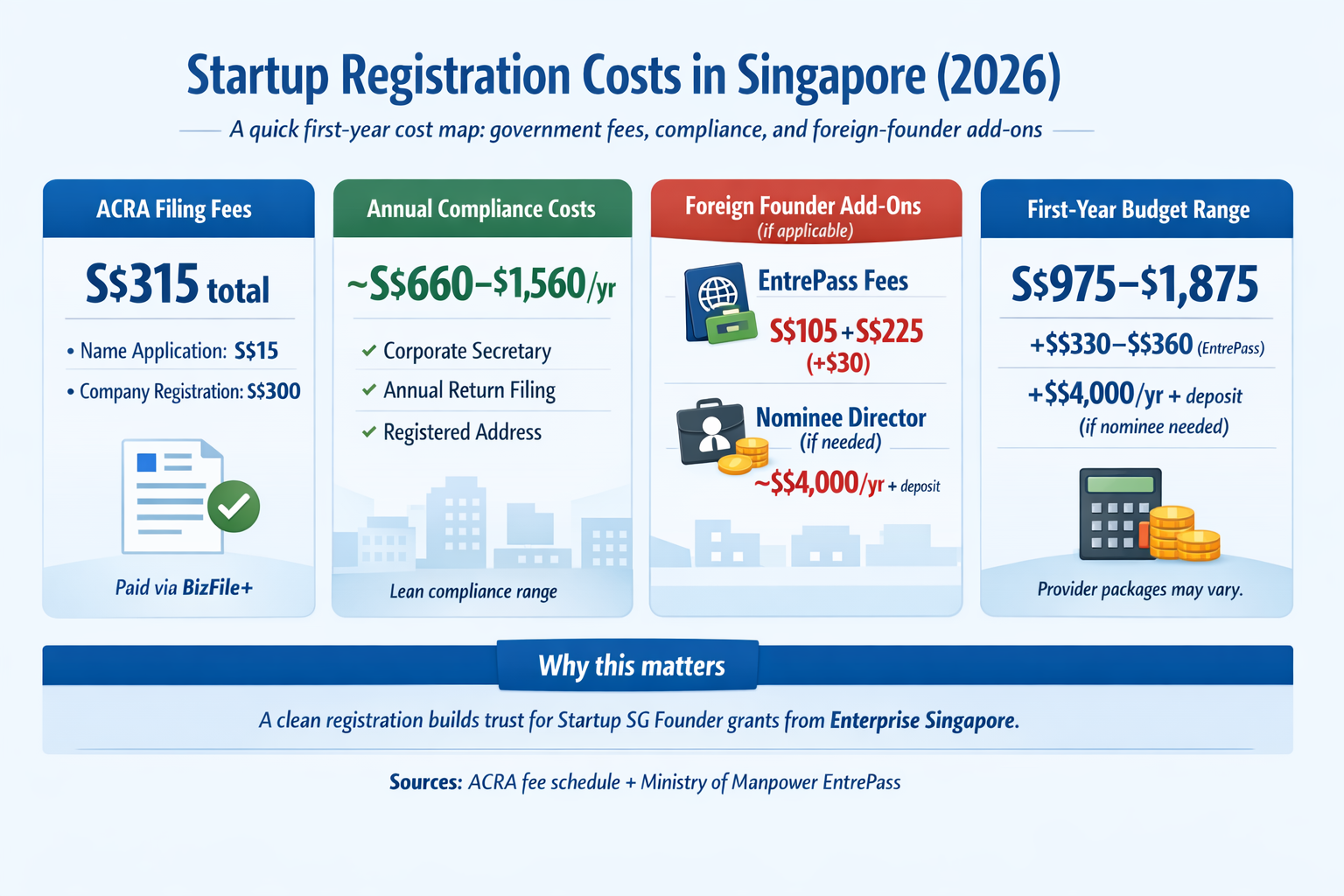
Office Space and Co-Working Costs in Singapore (2026)
Office space costs in Singapore in 2026 are a significant factor for startups. Many founders opt for co-working spaces over traditional offices due to their flexibility and lower costs. In prime areas like Raffles Place or Marina Bay, co-working desks cost around SGD 400–700 per month per person. Private rooms in the same areas may reach SGD 1,500 or more. These numbers are high compared to Bangkok but lower than Tokyo or Hong Kong.
For early-stage founders, budget-friendly co-working options exist in neighborhoods such as Paya Lebar or Jurong. Here, hot desks start at SGD 200/350 per month, offering Wi-Fi, meeting rooms, and shared resources. This is enough for startups that want a professional address without high costs.
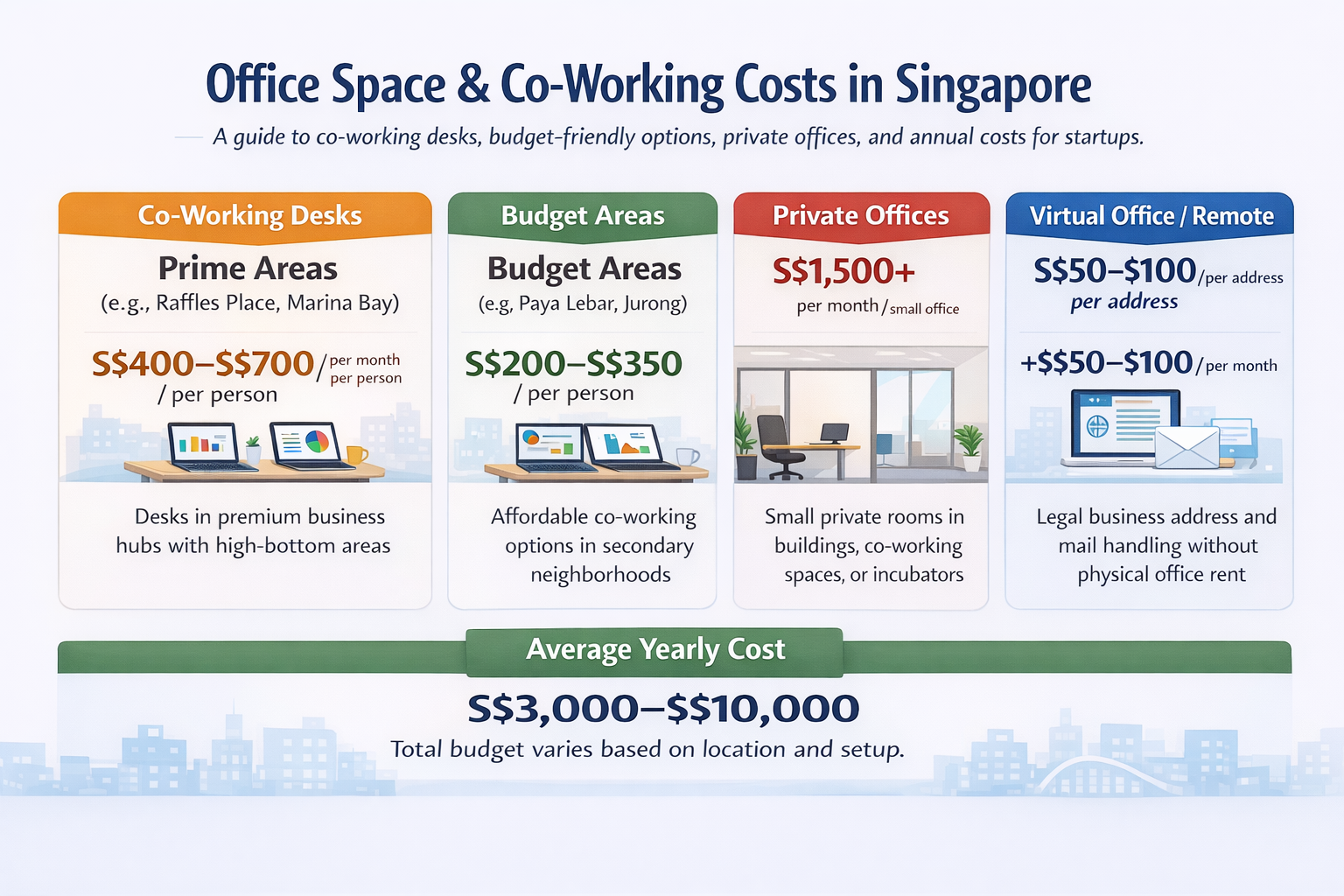
Some incubators in Singapore 2026 provide free or discounted office space for startups accepted into their programs. For example, LaunchPad at one-north offers reduced rent to encourage innovation. Joining such hubs can save thousands each year while also giving networking opportunities. Another option is running remote-first startups. Many founders in 2026 use virtual office addresses for SGD 50/100 per month. This allows access to legal mail handling and a Singapore business address without physical rent.
When planning costs, startups should compare:
Prime location prestige vs. secondary area affordability.
Networking value of co-working hubs vs. savings from remote setups.
Short-term flexibility vs. long-term lease stability.
On average, startups in Singapore spend SGD 3,000–10,000 yearly for office needs, depending on setup.
Hiring and Salary Costs for Startups in Singapore
Hiring talent in Singapore in 2026 is one of the most significant expenses for startups. Skilled employees drive growth, but salaries are higher compared to many Southeast Asian markets. For entry-level roles such as marketing assistants or junior developers, salaries range from SGD 2,800 to SGD 4,000 per month. Mid-level professionals, such as software engineers or digital marketers, earn SGD 5,000/8,000 monthly. Senior roles such as product managers or CTOs can cost SGD 10,000/18,000 per month, depending on experience and sector.
Startups in fintech, biotech, and AI face more competition. Demand for specialized talent means salary packages can rise 15-20% higher than the average market rate. Many early-stage founders lower costs by hiring freelancers, remote staff from nearby countries, or leveraging co-founders to cover key functions. Outsourcing tasks like design, SEO, and customer support is another way to reduce payroll pressure.
Government support programs in Singapore 2026, such as the Enterprise Development Grant (EDG), can cover up to 70% of manpower training costs. This helps startups build strong teams without overspending. Overall, salary expectations in Singapore mean founders should budget carefully. On average, startups spend 40-60% of their total operating expenses on people costs in the first year.
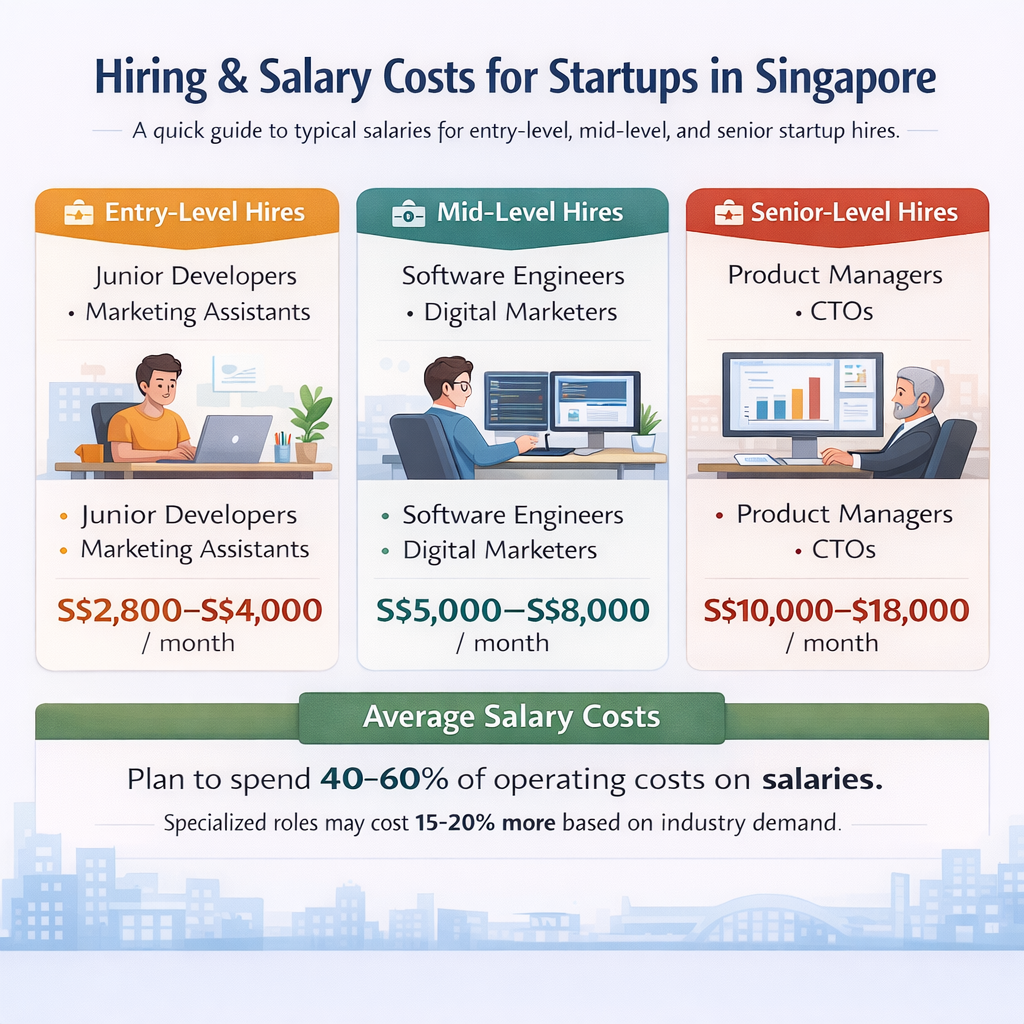
Licensing, Legal, and Compliance Costs in Singapore
Legal setup costs for startups in Singapore 2026 go beyond incorporation. Founders need to budget for licensing, compliance, and ongoing filings. These costs may seem small on the surface. But they add up fast. Planning helps avoid surprises.
Singapore charges S$15 for a name application and S$300 for company incorporation, totaling S$315 to register with ACRA. For foreign founders, using a corporate service provider (CSP) is common, adding S$600 to S$2,000 for full-service packages. Ongoing compliance includes mandatory services. Corporate secretary, annual filing, and registered address cost roughly S$300–800 yearly.
Licenses vary by industry. For fintech firms, approval from MAS may involve thousands of dollars. F&B ventures need a Singapore Food Agency permit, starting from S$200/500, depending on complexity. Here’s a quick comparison table of typical legal and compliance costs:
| Cost Component | Estimated Range (SGD) | Notes |
|---|---|---|
| ACRA Name + Registration Fees | S$315 | Government fees only |
| CSP Incorporation + Services | S$600–2,000 | Includes secretary, address, filings |
| Annual Compliance (Secretary + Filing) | S$300–800/year | Recurring legal obligations |
| Industry-Specific Licenses | S$200–2,000+ | Varies: food, fintech, education, etc. |
Good compliance builds trust. Investors and banks expect a clean legal record. Clients do too. Founders who budget 10-15% of setup costs for licensing and compliance in 2026 will avoid delays and penalties. Staying compliant isn’t just a legal step. It’s a growth strategy.
Technology, Infrastructure, and Remote Operations Costs in Singapore
For startups in 2026, technology and infrastructure costs in Singapore are some of the most significant. They cover everything from software subscriptions to office systems. Choosing the right stack early makes scaling easier.
Cloud and Software Costs
Cloud computing dominates the Singapore startup ecosystem in 2026. Most founders use AWS, Google Cloud, or Azure. Entry-level packages start at S$50–100 per month, but scaling can push bills into S$1,000+.
Other must-have subscriptions include:
Collaboration tools (Slack, Microsoft Teams, Notion) – S$10–20 per user/month
CRM systems (HubSpot, Zoho, Salesforce) – S$30–100 per user/month
Marketing automation tools – S$50–300/month
Cybersecurity solutions – S$100–400/month
Singapore’s government supports digitalization with grants like the Productivity Solutions Grant (PSG), which covers up to 70% of eligible software costs in 2026.
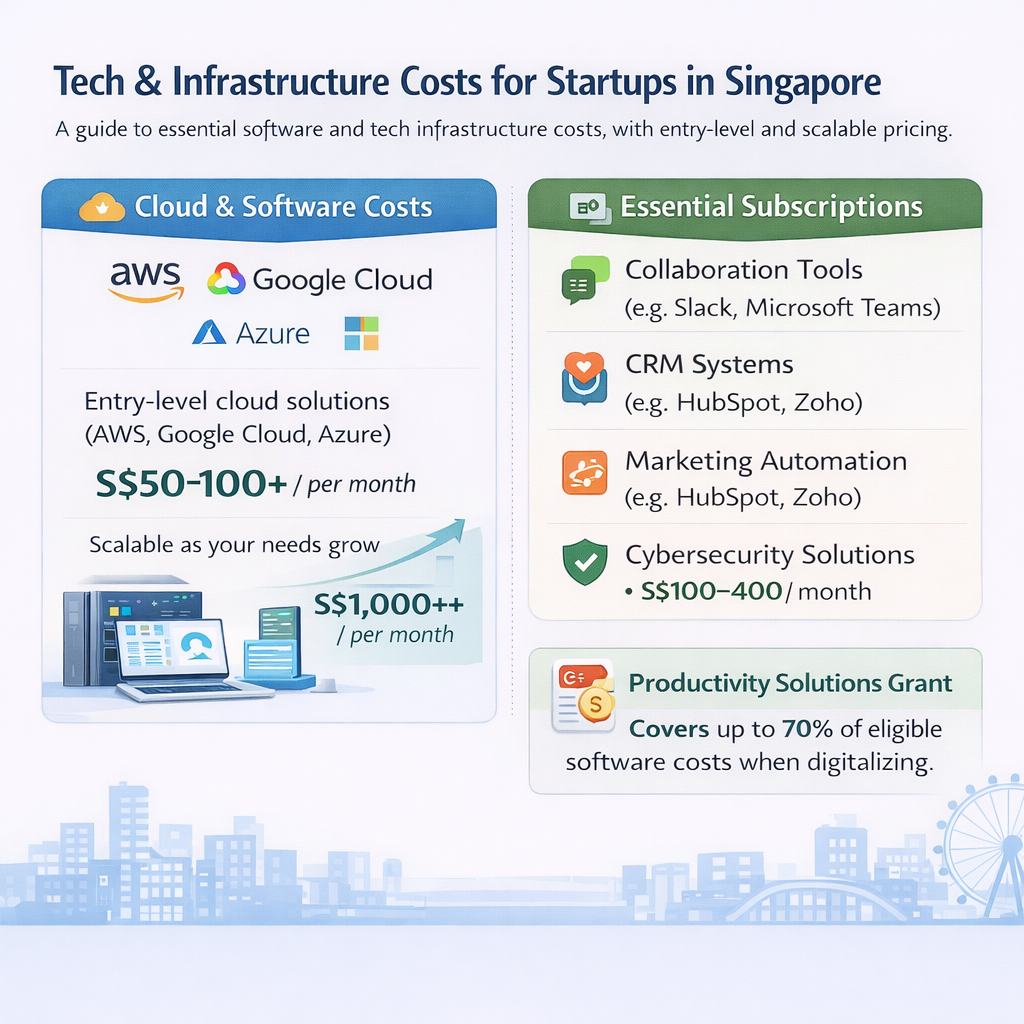
Remote Operations and Infrastructure
Remote-first models are growing. Many Singapore startups opt for co-working memberships over full offices. Prices in 2026:
Hot desk: S$250-400/month per person
Dedicated desk: S$400-700/month
Private office: S$800-1,200/month
Founders also need reliable broadband. Business-grade fiber in Singapore costs S$100-200/month, with speeds up to 1Gbps.
When combined, a lean early-stage startup may spend S$500-1,000/month on core digital infrastructure. Scaling companies should budget S$3,000–5,000/month by Series A.
Startups that optimize cloud usage and apply for PSG grants reduce burn rates while staying competitive. Tech costs in 2026 aren’t optional – they are the backbone of scalability, security, and investor confidence.
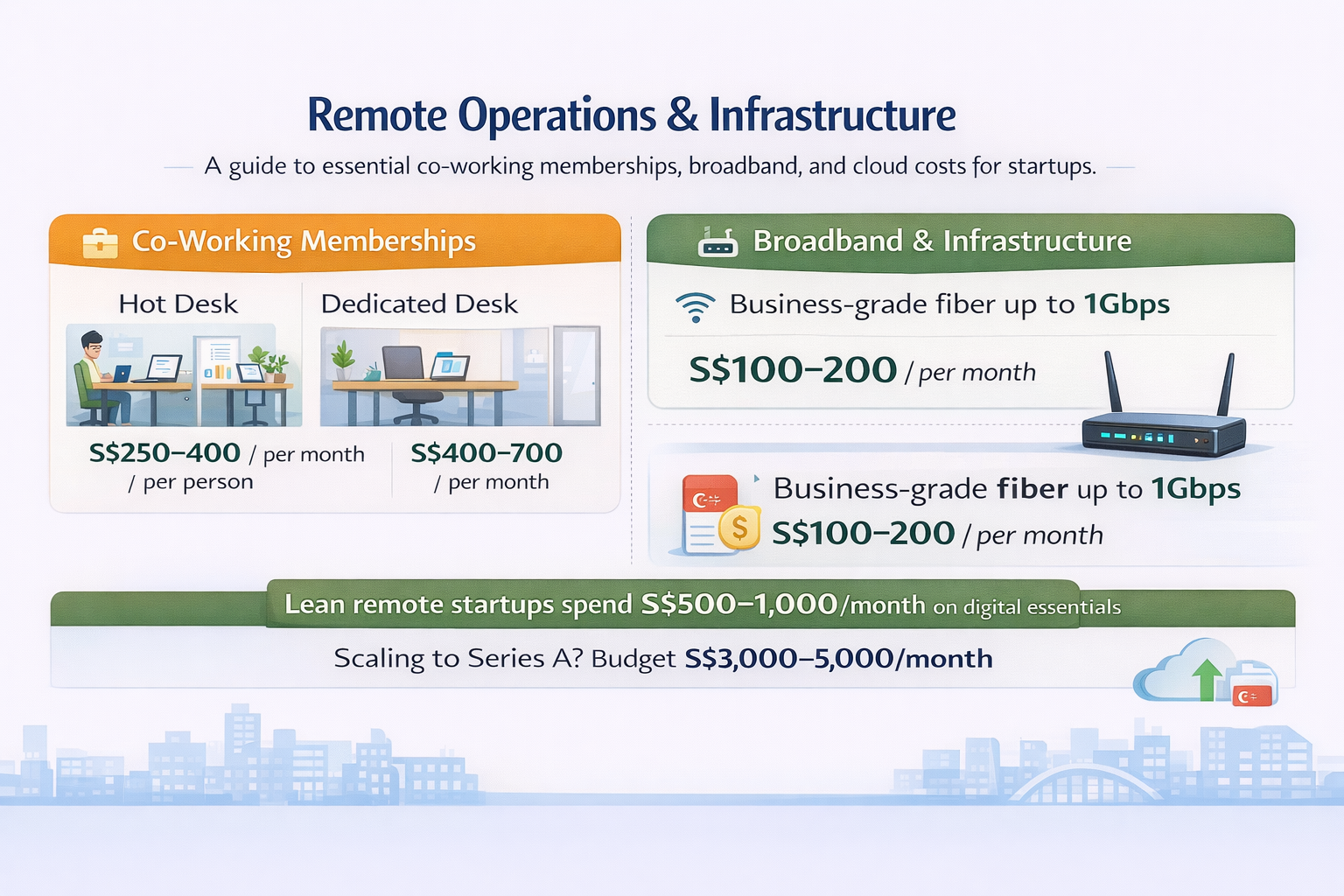
What are Marketing and Customer Acquisition Costs in Singapore 2026?
In 2026, marketing and customer acquisition costs in Singapore are a significant concern for startup founders. Whether you are building an e-commerce business, a SaaS company, or a consumer-facing app, customer acquisition cost (CAC) determines your survival. Singapore remains one of the most competitive startup hubs in Asia, which means acquiring users often requires bigger budgets compared to emerging markets like Vietnam or Indonesia.
For founders, the real question is not whether to spend, but how much to allocate between paid advertising, SEO, PR, and influencer marketing. Below, we break down the costs and strategies most relevant in Singapore’s 2026 startup ecosystem.
Digital Marketing and Paid Ads in Singapore
Typical monthly ad budgets for startups in Singapore range between S$2,000 and S$10,000, depending on industry and growth stage.
Key 2026 advertising costs:
Google Ads Singapore: CPC from S$1.20–3.50; industries like legal services and fintech push above S$4.
Facebook & Instagram Ads: CPM averages S$8–12, with strong performance in fashion, retail, and travel startups.
TikTok Ads Singapore: Still cheaper, with CPM around S$4–6, making it the fastest-growing acquisition channel for consumer startups.
LinkedIn Ads: High cost, CPC between S$5–9, but essential for B2B SaaS and professional services startups targeting corporate buyers.
Founders in Singapore often adopt multi-channel campaigns to test which platform delivers lower CAC before scaling budgets.
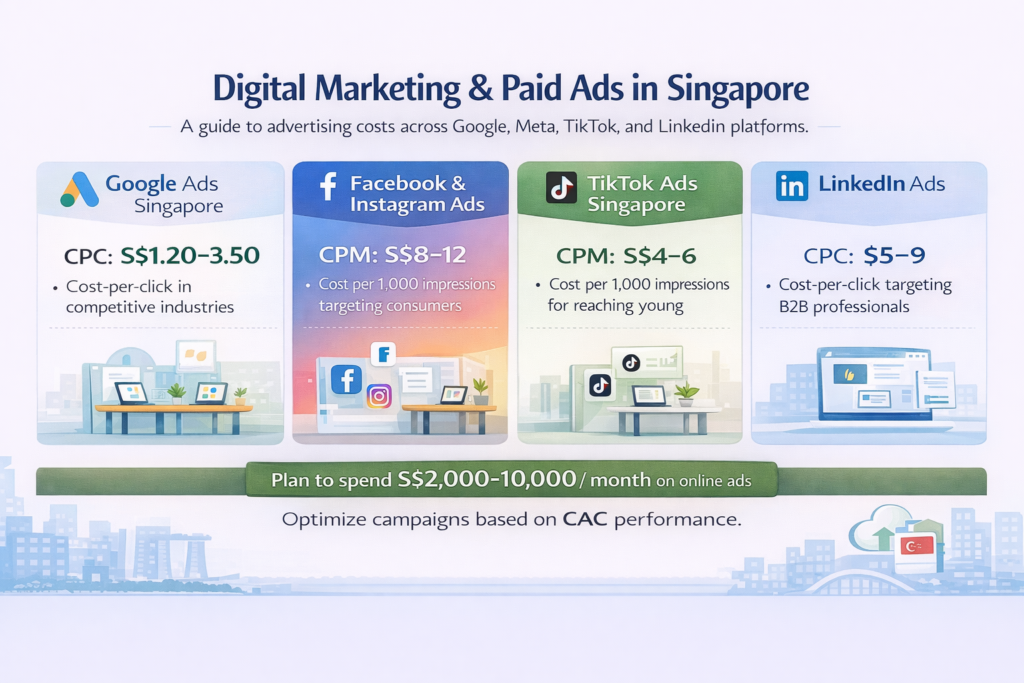
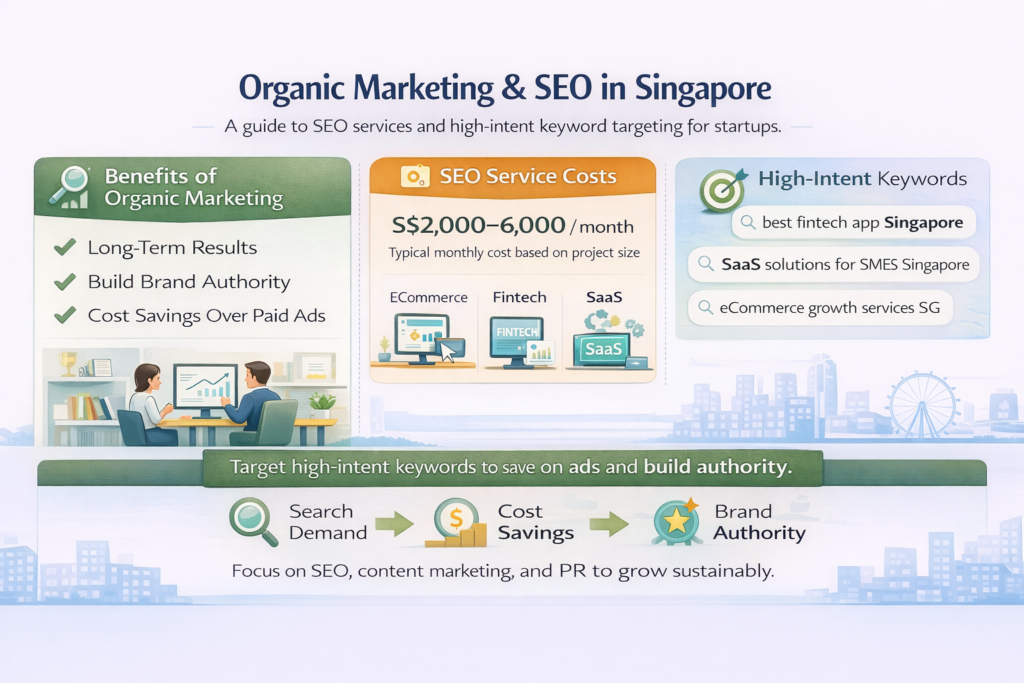
Organic Marketing and SEO
Unlike paid ads, organic marketing strategies such as SEO, content creation, and PR deliver long-term results. In Singapore, the cost of SEO services in 2026 ranges from S$2,000 to S$6,000 per month, depending on the size of the campaign.
Search demand is strong in industries like Singapore eCommerce SEO, fintech SEO, and SaaS marketing Singapore, where startups compete for high-intent keywords like:
“best fintech app Singapore 2026”
“SaaS solutions for SMEs Singapore”
“eCommerce growth services Singapore”
By targeting these search intent phrases, startups not only save on paid campaigns but also build brand authority that investors value.
Influencer Marketing and Partnerships
Influencer marketing in Singapore continues to grow in 2026. According to Campaign Asia (2025), 65% of consumer startups in Singapore use micro-influencers for customer acquisition.
Costs vary widely:
Micro-influencers: S$200–800 per post or campaign.
Mid-tier influencers: S$1,000–3,000 per campaign.
Top-tier influencers: S$5,000+ per collaboration.
For startups in fashion, lifestyle, food delivery, and beauty tech, influencer partnerships are often more cost-efficient than paid ads. Combined with referral programs and affiliate marketing in Singapore, they help reduce CAC.
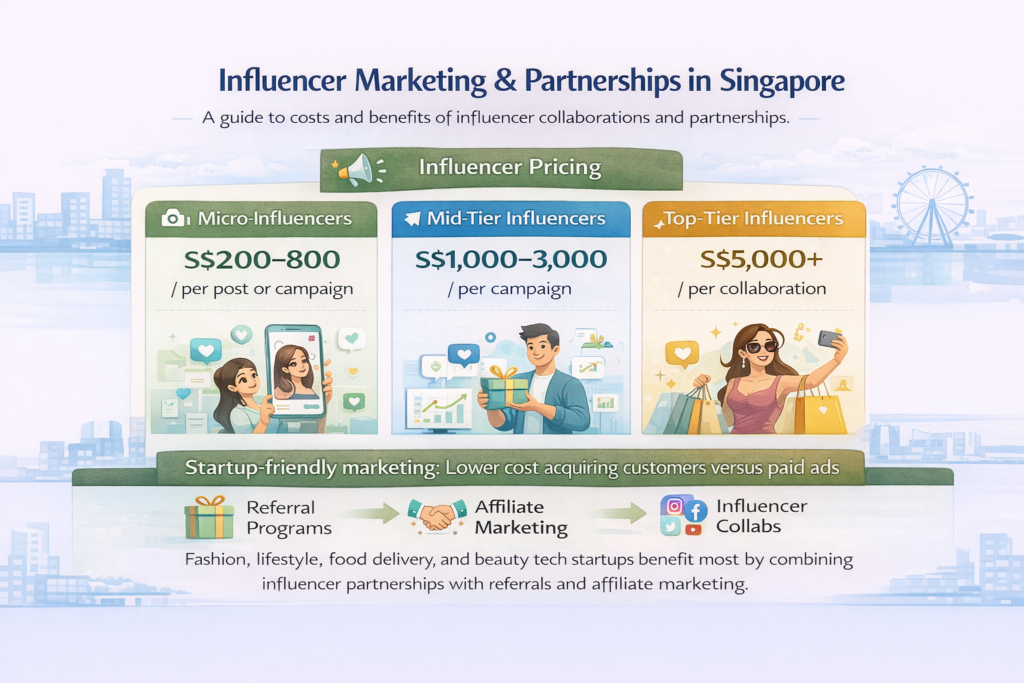
Average Customer Acquisition Cost (CAC) in Singapore
The average CAC in Singapore startups ranges from S$120–350 per customer, depending on sector. B2B startups with high deal values usually accept higher CAC, while B2C startups fight for volume at lower acquisition costs.
A comparison of CAC trends in Singapore 2026:
| Startup Type | Average CAC 2026 | Notes |
|---|---|---|
| B2C eCommerce startups | S$120–180 | Lower CAC due to viral marketing, TikTok ads, and influencer campaigns |
| SaaS startups | S$200–300 | Higher CAC but strong LTV from subscription models |
| Fintech & Banking apps | S$250–350 | Regulatory compliance and trust-building make acquisition more expensive |
| Food delivery & lifestyle apps | S$130–200 | Competitive but offset by referral programs and promos |
What are Strategic Takeaways for Founders Expanding to Singapore?
To control CAC in Singapore’s competitive market, startups must balance short-term ad spend with long-term organic investments. Key 2026 strategies include:
Using TikTok and Instagram ads for lower-cost B2C traction.
Invest in SEO Singapore 2026 services early for sustainable visibility.
Testing affiliate and referral programs to cut acquisition costs.
Combining LinkedIn B2B ads with content marketing for SaaS startups.
Building a multi-channel funnel that reduces reliance on one platform.
Startups that blend performance marketing with organic visibility achieve lower CAC, stronger investor appeal, and faster scalability.
What are the costs of Office, Infrastructure, and Tech Costs in Singapore?
Running a startup in Singapore requires careful planning around office space, infrastructure, and technology costs. In 2026, many founders are choosing co-working spaces in Singapore over traditional offices to reduce overhead. Popular hubs like WeWork, JustCo, and The Working Capitol offer flexible memberships from S$350 to S$600 per desk per month, far cheaper than leasing.
For those who scale quickly, office rental costs in Singapore CBD average S$8-12 per square foot monthly. This makes Singapore pricier than Thailand or Vietnam, but the trade-off is world-class infrastructure and investor access. Technology costs also add up. Startups spend between S$1,000 and S$5,000 monthly on SaaS tools, cloud hosting, and collaboration platforms. Cloud providers like AWS Singapore, Google Cloud, and Microsoft Azure remain essential for scaling startups, with packages tailored to early-stage companies.
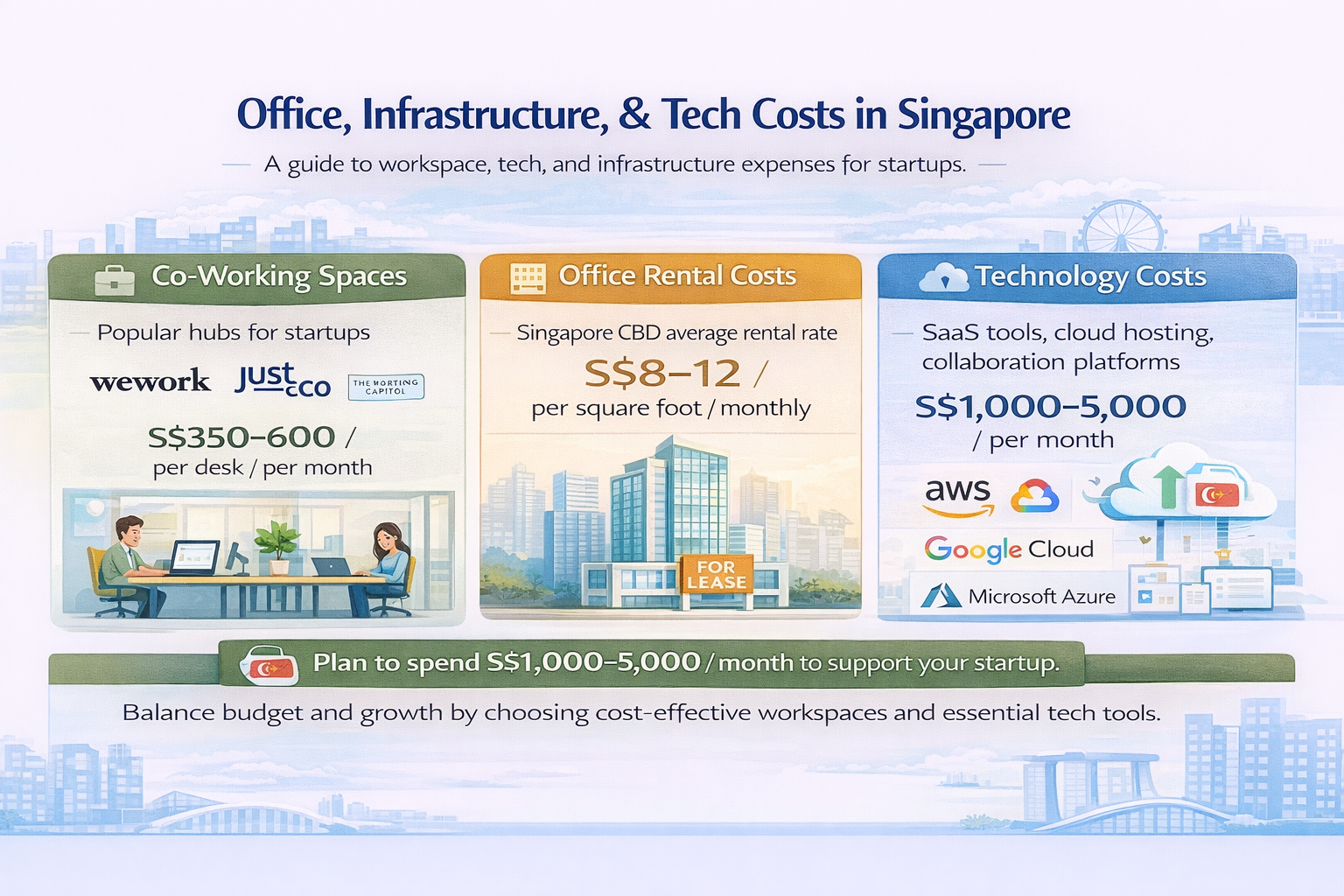
Additionally, Singapore government grants for startups, such as the Productivity Solutions Grant (PSG) and Startup SG Tech, help offset infrastructure and software expenses, making innovation more affordable. For founders, the key is balancing lean operations with scalable tools. By leveraging co-working spaces, cloud technology, and government funding, startups in Singapore can keep infrastructure costs manageable while staying investor-ready.
Comparison: Singapore vs. Other APAC Startup Hubs (2026)
Founders often compare startup costs in Singapore with those in other APAC markets before deciding where to launch. While Singapore is more expensive than cities like Bangkok or Ho Chi Minh City, it offers unmatched infrastructure, funding access, and international credibility. In 2026, the choice is less about absolute cost and more about value for long-term growth.
What are Startup Cost Comparison in APAC 2026?
Here’s a breakdown of estimated yearly costs for early-stage startups across key hubs in Asia-Pacific:
| Cost Category | Singapore 2026 | Hong Kong 2026 | Bangkok 2026 | Ho Chi Minh 2026 |
|---|---|---|---|---|
| Company Registration | SGD 300–600 | HKD 1,500–3,000 | THB 6,000–12,000 | VND 2–5 million |
| Office/Co-Working | SGD 3,000–10,000 | HKD 20,000–40,000 | THB 2,500–7,000 | VND 2–6 million |
| Average Salary (Mid-Level) | SGD 5,000–8,000 | HKD 25,000–40,000 | THB 30,000–50,000 | VND 15–25 million |
| Marketing Budget (Year 1) | SGD 20k–60k | HKD 150k–300k | THB 300k–700k | VND 200–500m |
| Government Support | Up to 70% via EDG, PSG, Startup SG | Limited grants, investor-driven | Incentives for BOI-approved sectors | Grants in tech parks, but less global reach |
Why Founders Still Choose Singapore in 2026?
Despite higher costs, Singapore remains the top startup hub in Southeast Asia. Government support programs such as Startup SG Founder Grant and Enterprise Development Grant cover significant expenses. Investors also trust Singapore’s strict compliance standards, which make raising seed or Series A funding easier.
Founders in e-commerce, SaaS, fintech, and deep tech sectors often prefer Singapore over Bangkok or Ho Chi Minh City because of its reliable legal framework, global connectivity, and tax incentives. While Thailand or Vietnam may look cheaper, scaling globally is harder without Singapore’s international reputation.
The real value lies in balancing higher upfront costs with long-term investor confidence and expansion opportunities. For startups aiming to grow across APAC, Singapore’s ecosystem remains the safest bet in 2026.
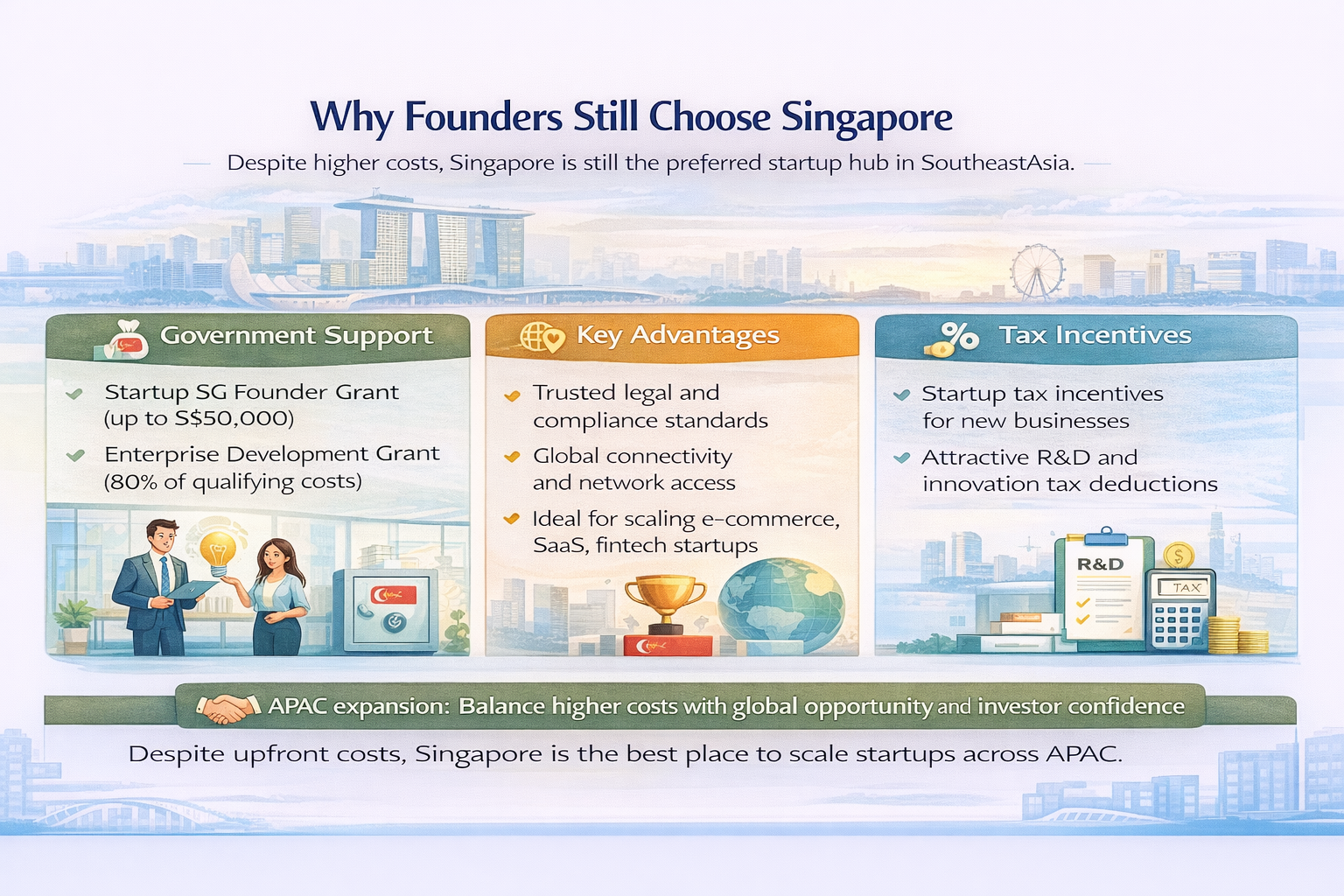
Conclusion
Building a startup in Singapore in 2026 costs more than in nearby markets, but the ecosystem delivers unmatched credibility, investor access, and government support. From registration and salaries to marketing and infrastructure, founders must plan budgets carefully. What seems expensive upfront often pays off in long-term global growth opportunities. Singapore’s reliable legal framework, strong talent pool, and grant schemes reduce risks while attracting capital. For founders seeking to expand across Asia-Pacific, the investment is worth it. With the proper planning, Singapore remains one of the best places to build a scalable, global startup.
Singapore Startup Costs 2026 FAQ
What are the startup registration costs in Singapore in 2026?
For a standard private limited company, government fees are S$15 (name application) + S$300 (registration), so S$315 total if you do it directly. Many founders still spend more because they add a corporate secretary, registered address, and filing support.
What are the “hidden” first-year compliance costs founders forget to budget?
The common misses are: corporate secretary service, registered address, annual filing, basic legal templates, and occasional advisory when banks, partners, or investors request documents. These are not optional if you want clean operations and fewer delays later.
How much does the EntrePass cost in 2026 (and what should founders plan for)?
The government fees are S$105 when you submit and S$225 when the pass is issued (plus S$30 if a Multiple Journey Visa applies). Budget beyond the fees, too, most founders still spend time/money preparing a strong application package
How can aboveA help lower startup costs in Singapore without cutting corners?
A partner like aboveA typically reduces waste, not compliance: clearer budget planning, fewer wrong tool decisions, tighter go-to-market testing, and better tracking so you stop paying for channels that don’t convert. The goal is a cleaner runway and fewer expensive reversals.

